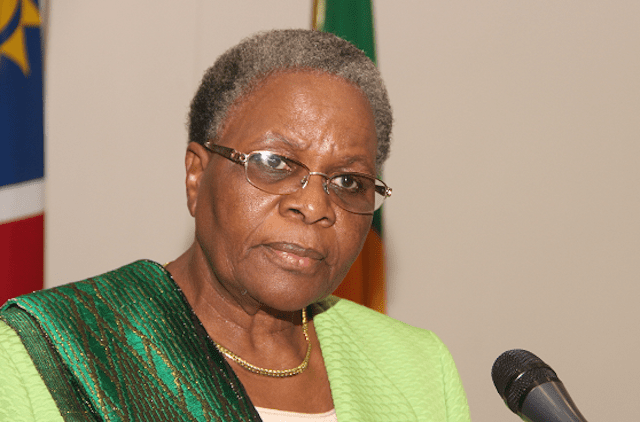Nicknamed NNN, Netumbo Nandi-Ndaitwah has made history by being elected as Namibia’s first female president.
The 72-year-old won more than 57% of the vote, with her closest rival, Panduleni Itula, getting 26%, according to the electoral commission.
It is just the latest episode in a life packed with striking events – Nandi-Ndaitwah has fought against occupying powers, fled into exile and established herself as one of the most prominent women in Namibian politics.
However, Itula has rejected her victory. He said the election was “deeply flawed”, following logistical problems and a three-day extension to polling in some parts of the country.
His Independent Patriots for Change (IPC) party said it would challenge the result in court.
Nandi-Ndaitwah has been a loyal member of the governing party, Swapo, since she was a teenager and pledges to lead Namibia’s economic transformation.
Nandi-Ndaitwah was born in 1952, in the northern village of Onamutai. She was the ninth of 13 children and her father was an Anglican clergyman.
At the time, Namibia was known as South West Africa and its people were under occupation from South Africa.
Nandi-Ndaitwah joined Swapo, then a liberation movement resisting South Africa’s white-minority rule, when she was only 14.
A passionate activist, Nandi-Ndaitwah became a leader of Swapo’s Youth League.
The role set her up for a successful political career, but at the time Nandi-Ndaitwah was simply interested in freeing South West Africa.
“Politics came in just because of the circumstances. I should have become maybe a scientist,” she said in an interview this year.
While still a high school student, Nandi-Ndaitwah was arrested and detained during a crackdown on Swapo activists.
As a result of this persecution, she decided she could not stay in the country and joined several other Swapo members in exile.
She continued to organise with the movement while in Zambia and Tanzania, before moving to the UK to undertake an International Relations degree.
Then in 1988 – 14 years after Nandi-Ndaitwah fled her country – South Africa finally agreed to Namibian independence.
Nandi-Ndaitwah returned home and subsequently joined the post-independence, Swapo-run government.
In the years since, she has held a variety of posts, including ministerial roles in foreign affairs, tourism, child welfare and information.
Nandi-Ndaitwah became known as an advocate for women’s rights. In one of her key achievements, she pushed the Combating of Domestic Violence Act through the National Assembly in 2002.
According to Namibian media, Nandi-Ndaitwah criticised her male colleagues for trying to ridicule the draft law, sternly reminding them that the Swapo constitution condemns sexism.
She continued to rise despite Namibia’s traditional and male-dominated political culture, and in February this year she became vice-president.
She suceeded Nangolo Mbumba, who stepped up after the death of then-President Hage Geingob.
In her personal life, Nandi-Ndaitwah is married to Epaphras Denga Ndaitwah, the former chief of Namibia’s defence forces. The couple has three sons.
Throughout her career, Nandi-Ndaitwah has displayed a hands-on, pragmatic style of leadership.
She once declared in a speech: “I am an implementer, not a storyteller.”








